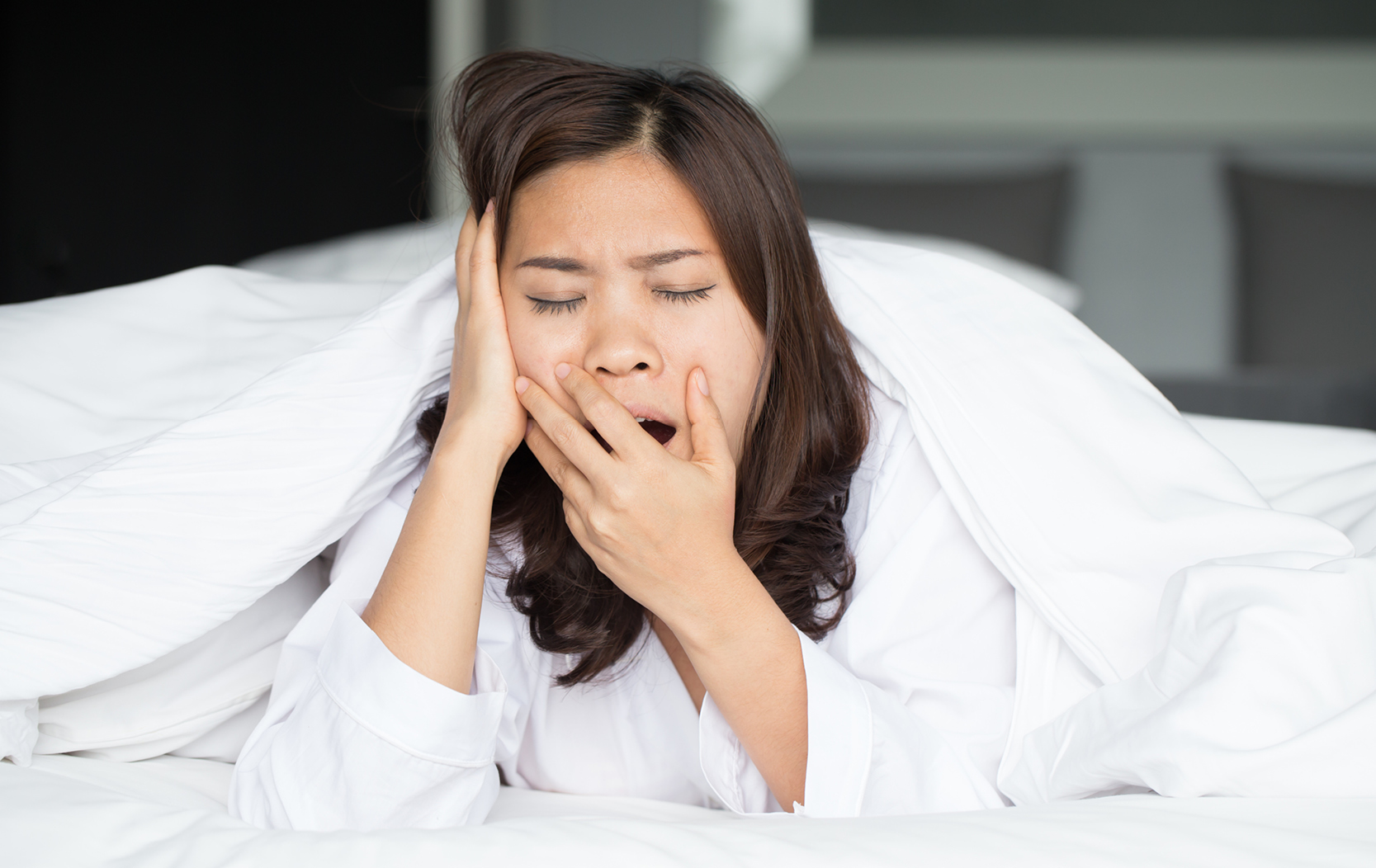Can Sleep Impact Your Weight Loss Goals?
March 8, 2019,
Rebecca Haresign

How much sleep do you get each night? Sleep is important for our bodies to replenish energy and make repairs, and it’s recommended adults aim for between 7-9 hours’ sleep per day (1). But according to research carried out by The Sleep Council, 70% of Britons sleep for seven hours or less per night (2).
Researchers have recognised a relationship between not getting enough sleep and carrying excess weight (3, 4), and poor sleep could also have an impact on the foods we find appealing.
Can sleep affect our appetite?
Researchers at King’s College London reviewed numerous studies that had been carried out to establish whether people consumed more calories after insufficient sleep (4). They found that when participants were a little sleep deprived, they consumed an additional 385 calories. However, there was no increase in energy expenditure, meaning participants weren’t doing any additional physical exercise to balance the additional calorie intake. Whilst consuming an additional 385 calories might not seem like much, this can quickly add up over time and can result in gradual weight gain.
Research has shown that reducing the number of hours we sleep can alter levels of the hormones that are involved in energy balance regulation; leptin and ghrelin. Poor sleep can reduce leptin, which could cause us to favour sugary foods and increase overall food intake (5). When ghrelin levels are increased after a bad night’s sleep, this can also increase appetite (6, 7). Both areas offer suggestion as to why we feel hungrier and are more attracted to unhealthy food choices when we’re tired.
How can sleep affect our food choices?
Not only can poor sleep result in consuming more calories, it has also been shown that after poor sleep we’re more likely to favour fat intake instead of protein (4). A reduction in leptin can cause us to favour sugary foods, and an increase in ghrelin increases the desire for rewarding foods (8, 9).
Interestingly, another group of researchers at Kings College London studied whether getting more sleep reduced a person’s intake of free sugars. We are recommended to reduce our intakes of free sugars, which are the type of sugars found in foods like confectionary, jam, and desserts (10). The study concluded that sleeping for longer reduced the reported intake of free sugars in participants by around 10 grams, which consequently improved their overall diet quality.
Top tips for getting a good night’s sleep
When you’re looking to make healthy changes to your diet and lifestyle, don’t forget about the importance of sleep. Whilst there’s no single cause of poor sleep – genetics, hormones, poor eating and exercise habits, or irregular working hours could all be factors – the scientific literature suggests that sleep quality should be a priority for those seeking weight loss.
The Sleep Council recommend that adults require 7-9 hours of sleep per day (1). If you feel like you aren’t getting enough sleep, and that it’s impacting your goals, here are some top tips for improving your sleep:
- Avoid consuming caffeine, alcohol, spicy and fatty food before bed.
- Make sure your bedroom is dark, cool and quiet.
- Aim for a regular bed time.
- Start your wind down routine one hour before going to bed – this can include having a warm bath, doing some light yoga or meditation, or reading a book. Avoid using your phone and tablet screens for 30-60 mins before bed. As the blue light emitted from these devices can interfere with the body’s natural sleep cycle.
References
- The Sleep Council. How much sleep do we need? Available at: https://sleepcouncil.org.uk/how-much-sleep-do-we-need/ (accessed 19th February 2019)
- The Sleep Council. The Great British Bedtime Report. Available at: https://www.sleepcouncil.org.uk/wp-content/uploads/2013/02/The-Great-British-Bedtime-Report.pdf (accessed 19th Feburary 2019)
- Madrid-Valero J, Martinez-Selva J, Ordonana J. Sleep quality and body mass index: a co-twin study. J Sleep Res 2017;26:461-467
- Khatib H, Harding S, Darzi J, Pot G. The effects of partial sleep deprivation on energy balance: a systematic review and meta-analysis. Eur J Clin Nutr 2016:1-11
- Berthoud HR. Metabolic and hedonic drives in the neural control of appetite: who is the boss? Curr Opin Neurobiol 2011;21:888-896
- Prinz P. Sleep, appetite, and obesity – what is the link? PLoS Med. 2004; 1:e61
- Spiegel K, Tasali E, Penev P, Van Cauter E. Brief communication: sleep curtailment in healthy young men is associated with decreased leptin levels, elevated ghrelin levels, and increased hunger and appetite. Ann Intern Med. 2004;141:846-850
- Morselli L, Leproult R, Balbo M, Spiegel K. Role of sleep duration in the regulation of glucose metabolism and appetite. Best Prac Res. 2010;24:687-702
- Egecioglu E, Jerlhag E, Salome N, Skibicka KP, Haage D, Bohlooly YM, et al. Ghrelin increases intake of rewarding food in rodents. Addict Biol. 2010;15:304-311
- Swan GE, Powell NA, Knowles BL, Bush MT, Levy LB. A definition of free sugars for the UK. Public Health Nutr 2018;21(9):1636-1638




